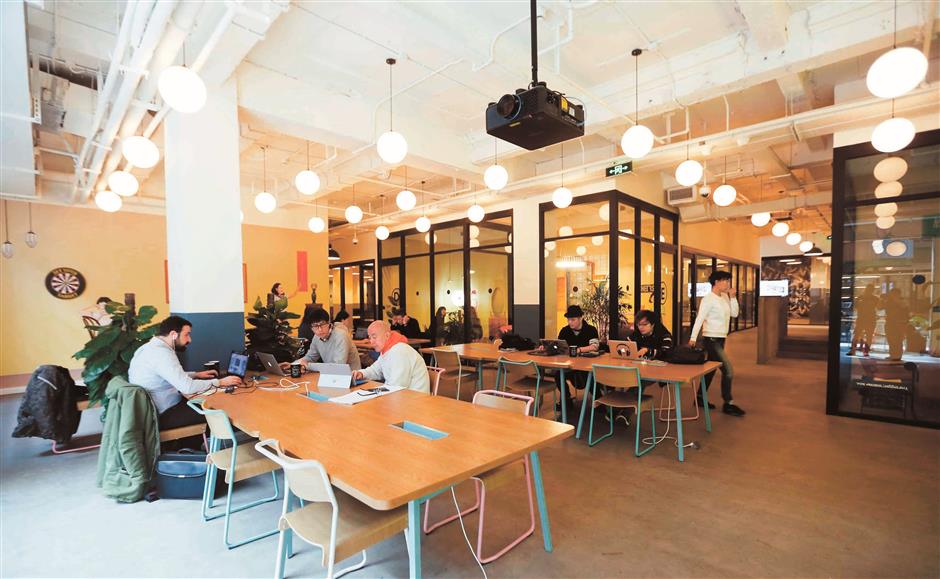Millennials adopt new work style

“Hubbers” at a Naked Hub site in Shanghai find relaxed environment conducive to the exchange of ideas.
Stanley Chen started a company making documentary travelogues about half a year ago.
One of the first tasks facing The Glimpse, which has two full-time staff including Chen and three part-time employees, was finding a workplace that suited a small, startup company and didn’t cost an arm and a leg.
Chen was relieved when he saw an advertisement for Fountown, a co-work space that provides offices for entrepreneurial companies like his.
“I rent just one workstation here, but Fountown provides other services, such as shared meeting rooms,” says Chen.
In China nowadays, the “sharing economy” has grown into a US$500 billion industry. The concept dovetails with the sociall networking craze embraced by millennials. If you can share bikes, cars and even spare rooms in your home, why not workspace as well?
What attracted Chen most was the atmosphere in the office Fountown provided. It’s in an office area with several other small companies, giving clients the chance to meet and exchange ideas about the complicated, sometimes risky issue of starting a business from scratch.
“There are some travel service companies here, and we often discuss new ideas and draw inspiration from one another,” said Chen.

A common area at Fountown

A client at a Fountown site takes a break from work in the facility's fitness room.
Co-working spaces are not particularly new in Europe or North America, but the concept is just gaining traction in China. The idea is believed to have started in California’s Silicon Valley in about 2006, but it didn’t start to take off on the Chinese mainland until nine years later.
Like The Glimpse, the clients of co-working spaces usually involve small teams of around 10 people, often operating on a shoestring. The workspaces sometimes provide limited kitchen facilities, complimentary coffee and tea, vending machines and comfortable lounge areas where clients can meet one another.
As one of the leading providers of the service, Fountown has more than 10,000 workstations all over China. It also provides services for entrepreneurial companies, such as helping with business registration, legal matters and financial advice.
“Our rental rate is over 90 percent in Shanghai, Beijing and Chengdu,” says Cheng Fangfang, an official with the company. “We’re probably the first domestic co-working provider that actually makes profit.”
Foreign companies are also trying to get a finger in the pie. By the time US-based WeWork entered the Chinese market last year, Shanghai-based Naked Hub had already grabbed the lion’s share of the market by late 2015. The two are now major competitors in China and elsewhere in Asia.
With the opening of its Loushanguan Road branch this month, Naked Hub now has 12 “hubs” in Shanghai, and the number is expected to rise to 15 soon. It attracts companies from all business segments, including tourism, computer science and design.
Naked Hub has announced a cooperative agreement with bicycle-sharing platform Mobike and co-living space provider Harbour Home to offer more conveniences to its clients, who are called “hubbers.”
“The agreement is expected to redefine the public concept of work and life,” says Johnathan Seliger, chief executive of Naked Hub. “We believe that the sharing economy will change life dramatically in the future.”

"Hubbers" at a Naked Hub site in Shanghai practice yoga at the rooftop fitness room.
But with opportunity comes challenge. Like other sharing-economy franchises, the co-working realm has seen its share of failures. Apart from industry leaders like Fountown and Naked Hub, many space providers don’t survive longer than a year.
The figures look cruel. In 2005, there were 2,300 co-working space providers in China, a 43-fold increase from the previous year. Many, if not most of them, went into bankruptcy a year later, and only 10 percent of them are expected to survive in the long term.
Wang Tao, senior leasing manager of ARCC Business Center, a multinational office provider, says many shared workplace providers struggle to make profit.
“Most of them don’t own the offices they rent to companies, but rather sublet the space,” says Wang. “The providers have to pay rents on that space, which is hard if they are suffering from high vacancy rates.”
Beijing-based Mad Space was a typical example. The provider entered the market with a roar in 2015, but left a year later with whimper. Users said they sensed trouble two months before Mad Space went bankrupt because of period electrical blackouts.
Mad Space officials later explained that they had a dispute with the property management company about the rental rates. The property management imposed a 9 percent rate rise that was beyond Mad Space’s capacity. The workplace was forced to shut down after the property managers cut off all the power for good.
A similar fate befell Shanghai-based AsianBiz, a co-working space provider that shut down in 2016 after years in the business because its funding chain broke and its owner disappeared. AsianBiz had 16 branches in the city.
Wang says stiff competition among providers sinks many of them. Many providers don’t develop unique business models that distinguish them from the pack or don’t offer attractive prices that clients can afford.
Wang does have a point. Nearly all small co-working space providers more or less look the same, even in their online advertisements. They simply copy what industry leaders such as Naked Hub are doing.
“I think the best way out for providers is to offer more diversified services,” said Wang, “for example, workplaces that cater to small companies in one industry only.”
There have been some successful examples of that concept. Shanghai-based People Squared recently entered into an agreement with independent music company Ocean Butterflies International to develop a workplace especially geared for music-related companies, while Beijing-based Kr Space mainly targets up-and-coming Internet companies and helps them find financing.
Wang says he expects to see more alliances among providers in the future.
“Smaller providers can ally with others for better resource integration,” he adds.
Fountown and another provider called UrWork recently announced a link-up, while WePlus and COWORK merged not long ago.
“Co-working workplaces occupy only around 5 percent of the whole office market now, and they have not shaken the traditional office model yet,” says Wang. “That influence is possibly yet to be seen.”

Clients share a common area at the WeWork co-workplace on Weihai Road in Shanghai.















